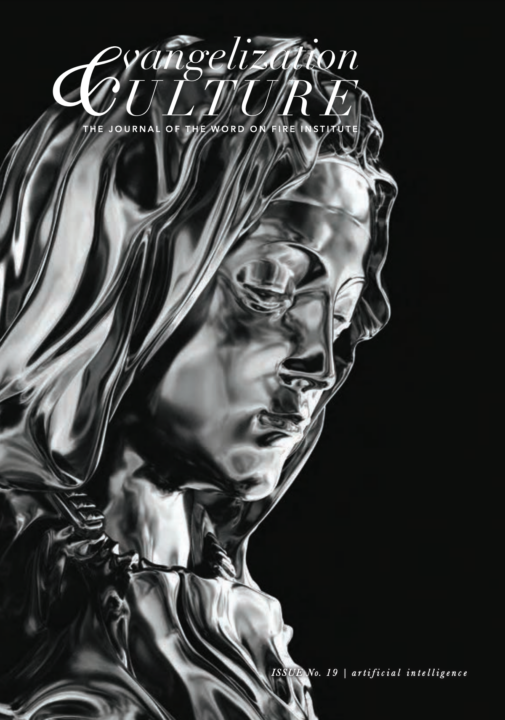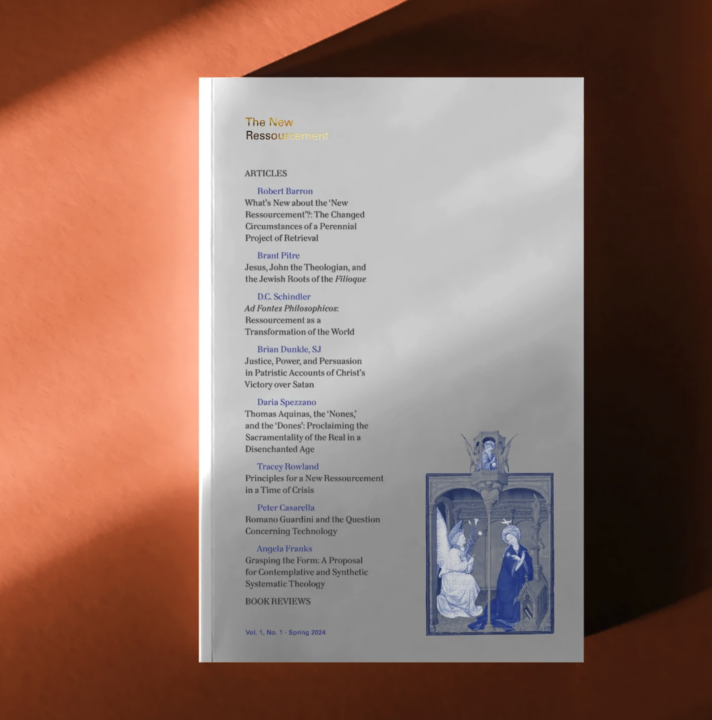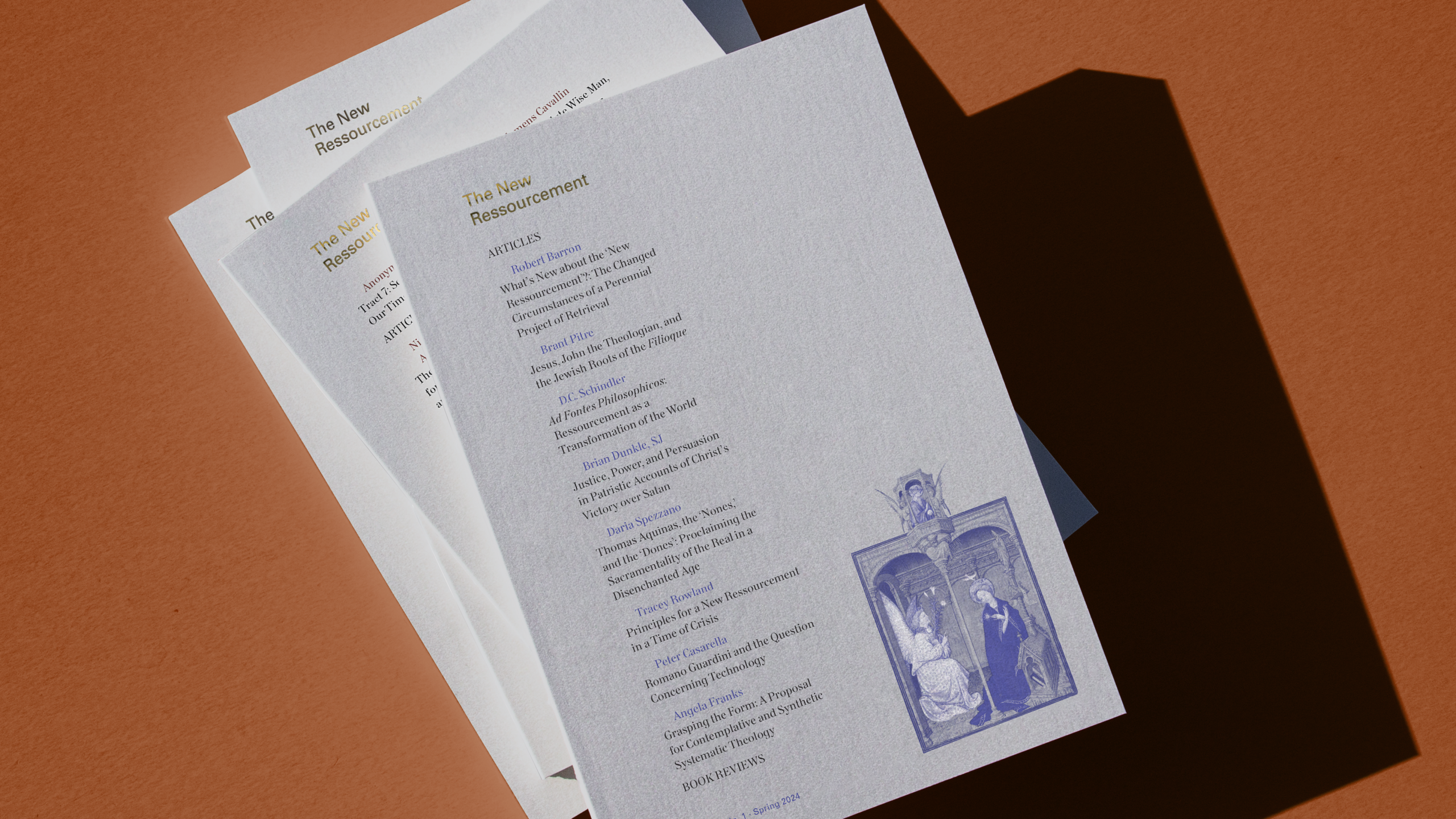
The following piece highlights the WOF Spotlight, “Broad and Deep: Why We Need The New Ressourcement,” from Issue XIX: “Artificial Intelligence” of the Word on Fire Institute’s quarterly print journal Evangelization & Culture.
Recently Tod Worner, the Managing Editor of Evangelization & Culture, had the opportunity to catch up with Dr. Jason Paone, the Editor of Word on Fire Academic, about Word on Fire’s exciting new academic journal, The New Ressourcement.
Tod Worner: Jason, as always, it is a pleasure to connect with you! Let’s begin our conversation exploring your background. Could you tell us a little about your family and faith? Where were you formed academically, and what was your field of study?
Jason Paone: I’m delighted to connect with you, Tod, and glad for an opportunity to contribute to Evangelization & Culture!
I’m a husband and father of three, and we entered communion with the Church in 2017, so I’m still sort of a “baby Catholic.” I was born and raised in a sectarian Evangelical movement that worked very hard to isolate its members from “the world,” including—perhaps especially—the Christian world. By this, I mean Christian Europe’s extraordinary intellectual and cultural legacy. I didn’t get to read many books as a young person, and that’s part of the story of how I ended up in graduate school. By accident, in my early twenties, I encountered a very powerful book that changed my life. The book was C. S. Lewis’ Mere Christianity. For a young man who had grown up reading only the literature produced by my insular community, discovering “mere” Christianity was something like experiencing color for the first time—or, maybe, like seeing the night sky for the first time. It simultaneously showed me how impoverished my sectarian Evangelical world was and gave me a first glimpse of the extraordinary wisdom and cultural wealth that Christians had produced in their two thousand years of reflection on the Gospel.
We hope to provide an outlet and an inspiration for a new movement in Catholic thought . . .
To make a long story short, I left that Evangelical community with my small family and enrolled at the University of Texas at Austin, where I studied philosophy and the classics in preparation for graduate programs in theology. After I graduated, I studied theology in a master’s program at Duke Divinity School. There, my study of the Church Fathers helped me to see how Catholic the Church was from the beginning. Two other influences that ultimately led me to the Church were John Henry Newman and an extraordinary Catholic professor named Reinhard Hütter.
Professor Hütter was such a great mentor and spiritual father to me at Duke that I ended up following him to the Catholic University of America when he took a position there near the end of my master’s program. I’ve been studying historical and systematic theology as a doctoral student at Catholic University of America for six years. In December 2023, I finished my doctoral dissertation under his supervision, and I’ll graduate this spring, completing fourteen years of college. I’m grateful to have been able to devote so much time to higher education, but I’m also thrilled to be finished with this enormous project and able to spend more time with my family.
How did you find yourself at Word on Fire?
It was providence, really. When my third child was on the way, I applied for a project manager position at Word on Fire, and around that same time—unbeknownst to me—they had launched an academic publishing imprint. On my CV, they saw my scholarly training and the years of experience I had as a moonlighting editor in graduate school, and so, instead of the project manager role, they offered me the opportunity to serve as editor of the academic imprint.
How would you describe your experience serving as Editor of Word on Fire Academic?
I would call it my dream job. The goal I’ve had in mind during all the years I’ve spent training to be a teacher and a scholar has been to contribute to the flourishing of Christian intellectual culture—as C.S. Lewis did! We Christians are a people of the book, and books have always been an essential medium and stimulant of Christian culture. It is thus a great honor and source of fulfillment for me to be able to play my small role in shaping and nurturing the Christian culture of tomorrow by finding and publishing the scholarly books and essays that will shape the minds of educators and students today.
We have featured some of the writers and publications from Word on Fire Academic in the pages of Evangelization & Culture. Could you tell us a little about some of the books you have published and how they have been received by the reading public?
I have to talk about our latest release, No Lasting City, by Frederick Christian Bauerschmidt. Bauerschmidt is undoubtedly one of the most penetrating Catholic thinkers alive and also one of the most wide-ranging in his interests and research. Both dimensions of his thought are prominently on display in No Lasting City, an eminently readable collection of his essays on theology, politics, art, and culture that draws upon a diverse cast of thinkers and creators, including the medieval mystic Julian of Norwich, the philosopher William James, the painters known as “the Flemish Primitives,” the sociologist Max Weber, the novelist Flannery O’Connor, and many others. The governing question underlying the essays of this collection is about the shape of Catholic culture and life in the secular, postmodern world we inhabit today.

Your latest endeavor has been the release of the inaugural issue of The New Ressourcement, Word on Fire’s quarterly journal of theology and philosophy. What is the origin of the journal’s name, and why did you feel it important enough to place it on the masthead of this academic journal?
The title is a homage to the ressourcement movement of the postwar era of the twentieth century. As some of your readers will know, the ressourcement was a movement of European (mostly French, as the term suggests) theologians and philosophers who sought to renew Catholic intellectual life and create new dialogue with the world by calling new scholarly attention to the Scriptures and the ancient and medieval Fathers and Doctors of the Church. Both the ressourcement movement and the neo-Scholasticism against which it reacted were admittedly more complex than many of the partisans of either camp have always been inclined to notice, but among other things, the ressourcement stands for a broadening and deepening of our engagement with our tradition that aims for a richer, more authentic Catholicism that can, in turn, shine brighter in the world and engage in more fruitful dialogue with it.
With the journal, we hope to provide an outlet and an inspiration for a new movement in Catholic thought—a new “return to the sources” that will breathe new life into the Catholic academy and intelligentsia and, in turn, reinvigorate Catholic culture and its witness to the world.
Where did the idea to create The New Ressourcement originate?
Bishop Barron, the journal’s founder, of course, deserves a great deal of the credit. His work and sensibility represent one concrete instantiation of the kind of fruitful dual engagement I described above that draws deeply and creatively from the whole tradition to engage the world in new, more fruitful, and compelling ways.
Matthew Levering also deserves credit. When I was brainstorming and bouncing ideas around, he proposed The New Ressourcement. Along with providing the title of the journal, he has been such a crucial source of input and inspiration that we had to give him the role of senior editor. We are lucky to have his leadership along with that of Jonathan Ciraulo and Fr. Aaron Pidel, who serve with him as editors of The New Ressourcement. And I can’t leave out the Associate Editor of Word on Fire Academic, David Augustine, whose contribution is essential both for the journal and our academic book production.
The inaugural issue features the work of a number of scholars who attended the first New Ressourcement Conference in the autumn of 2023. In this first issue, who will readers encounter and what topics will you be exploring? Will there be regular conferences affording a meeting of theological and philosophical minds?
Several of the essays we’ve collected in this inaugural issue represent broad proposals about the shape of the Catholic theology of the future. It features, for instance, an introductory essay by Bishop Barron that surveys many notable developments in the postconciliar Church and offers general principles that he hopes will guide the new ressourcement of Catholic thought. D.C. Schindler argues that the new ressourcement needs to reassert a metaphysical politics that clarifies the world’s relationship to the Church. Tracey Rowland explores seven principles for combatting religiosities that hate God, on the one hand, and what she calls bourgeois Christianity, on the other. She gleans these principles from the writings of a German ressourcement movement that gathered around the journal Hochland in the interwar period. Peter Casarella draws on Romano Guardini to contemplate the character of modern technologies.
These are just a few of the projects included in this inaugural issue of The New Ressourcement, whose stellar cast of authors includes Brant Pitre, Brian Dunkle, Daria Spezzano, and Angela Franks. Most of these essays are proceedings from the conference we hosted this past fall in Rochester, MN. There were many others in attendance who wrote papers for the journal that we’ll be publishing in subsequent issues. And we’re already planning the next conference for the fall of this year, which will bring together a whole new set of scholars around the project of The New Ressourcement.
Jason, as a theological scholar yourself, how would you describe academia’s current engagement with questions of faith? What questions are important to explore? Are there questions that have been neglected for too long?
Discovering “mere” Christianity was something like experiencing color for the first time—or, maybe, like seeing the night sky for the first time.
Speaking of the broader academy, I think the most generous way I could describe its regard for Christianity and questions of faith is with the word ‘indifferent.’ This is one point at which I think we have to say that the ressourcement movement of the postwar era failed in its aspiration to interject Catholic thought into the mainstream of modern and postmodern intellectual culture. They saw that the defensive and sometimes reactionary posture of the nineteenth-century neo-Scholastic paradigm had tended to marginalize and alienate Catholic thought. Moreover, they hoped that a revitalized intellectual culture with a more dialogical and missionary orientation might reclaim its place at the table in the intellectual discourse of the modern world. My conviction is that they had the right aspiration, and their ressourcement was the right way to pursue it, even if the movement didn’t achieve it—or not yet, anyway. More than any particular question or issue, what I think has been neglected and, in fact, mostly excluded from the mainstream of higher learning and thought throughout the twentieth and twenty-first centuries is contemporary Catholic thought. I don’t think we can accept this situation or content ourselves with our current place at the margins of the Western intellectual tradition—a tradition that Catholics are largely responsible for in the first place.
Academic journals can be somewhat daunting to the average reader. Who will be your target audience for The New Ressourcement? How can interested readers get a subscription?
We aim to reach a broad, non-specialist audience, even though, as an academic journal, we do cater to scholars, educators, researchers, and students. Make no mistake, The New Ressourcement isn’t breezy reading, but at the same time, there is very little, if anything, that is simply inaccessible to a patient and attentive reader with the aspiration to learn. Inspired by Bishop Barron’s insistence on an intellectually robust Catholicism that does not “dumb down” its richness and sophistication, one of my goals for the journal is to bring as many readers from outside the scholarly bubble as possible into the discourse and project of The New Ressourcement.
To subscribe, visit newressourcement.org/subscribe.
Finally, Jason, how have you personally been challenged and edified in your efforts to create and edit The New Ressourcement?
Starting a journal is quite an adventure—as you know better than I do. I’ve learned so much already and still have so much to learn. I’m honored and grateful to have been entrusted with the project, and I’m very excited to see how our debut goes!
With Bishop Barron, Matthew Levering, and many other editors and contributors, I thank you, Tod, for letting me introduce The New Ressourcement and all of our subscribers for their participation and support.

Members of the Word on Fire Institute can read more in their own print and digital copies of Evangelization & Culture Issue XIX: “Artificial Intelligence” this spring 2024.
Learn more about The New Ressourcement and subscribe for your own quarterly print subscription here.
